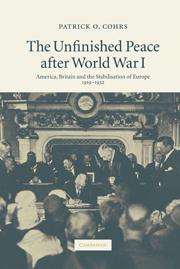Book contents
- Frontmatter
- Contents
- Acknowledgements
- List of abbreviations
- A note on the footnotes and bibliography
- Introduction
- Prologue
- 1 The wider challenges
- 2 Wilson, Lloyd George and the quest for a ‘peace to end all wars’
- 3 The ill-founded peace of 1919
- 4 The escalation of Europe's post-Versailles crisis, 1920–1923
- Part I The Anglo-American stabilisation of Europe, 1923–1924
- Part II Europe's nascent Pax Anglo-Americana, 1924–1925
- Part III The unfinished transatlantic peace order: the system of London and Locarno, 1926–1929
- Epilogue
- Conclusion
- Map: Post-World War I Europe after the peace settlement of Versailles
- Bibliography
- Index
1 - The wider challenges
The legacy of the Great War and the era of imperialism
Published online by Cambridge University Press: 21 July 2009
- Frontmatter
- Contents
- Acknowledgements
- List of abbreviations
- A note on the footnotes and bibliography
- Introduction
- Prologue
- 1 The wider challenges
- 2 Wilson, Lloyd George and the quest for a ‘peace to end all wars’
- 3 The ill-founded peace of 1919
- 4 The escalation of Europe's post-Versailles crisis, 1920–1923
- Part I The Anglo-American stabilisation of Europe, 1923–1924
- Part II Europe's nascent Pax Anglo-Americana, 1924–1925
- Part III The unfinished transatlantic peace order: the system of London and Locarno, 1926–1929
- Epilogue
- Conclusion
- Map: Post-World War I Europe after the peace settlement of Versailles
- Bibliography
- Index
Summary
Yet the cardinal reasons for why the efforts of 1919 could found no durable peace lie far deeper. This was due neither to Clemenceau's pursuit of harmful designs on Germany nor, primarily, to the fact that Wilson's principles were too rigid to make for workable solutions to Europe's underlying postwar problems, chiefly that of security. Rather than focus on explaining what the peacemakers at Versailles did or did not achieve, a re-appraisal of their efforts should elucidate what they could – and more importantly what they could not – achieve under the conditions of 1919. Answering this latter question requires not only a fresh look at the protagonists' aims and strategies as well as the constraints they faced, both international and domestic. It also requires placing the Paris negotiations in their proper historical context – against the background of how the international system had evolved in the ‘long’ nineteenth century. Crucially, Versailles followed a long period of escalating imperialist rivalry preceding the July crisis of 1914. This historical canvass can only be sketched in broad brushstrokes here; but it is indispensable.
What, then, were the most critical issues facing Anglo-American policymakers? And what were the main structural challenges that, to a greater or lesser extent, figured on their ‘mental maps’? In short, they not only had to cope with the immense human and material costs of the war on both sides of the trenches – unprecedented death tolls, devastation on the battle-fields and the immense political, economic and social consequences of a conflict that nearly ruined all major European belligerents.
- Type
- Chapter
- Information
- The Unfinished Peace after World War IAmerica, Britain and the Stabilisation of Europe, 1919–1932, pp. 25 - 29Publisher: Cambridge University PressPrint publication year: 2006



